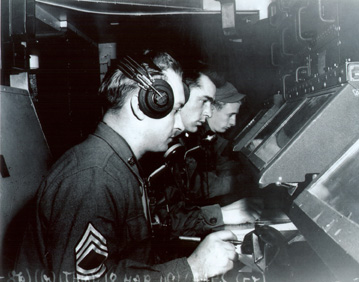A Reservist Flies the Berlin Airlift
Despite the festive air and good feelings that Operation Santa Claus engendered, the winter was not without its bad moments. Weather systems can be treacherous in northern Europe, and so they were in the 1948-1949 winter months. Fog, rain, ice, snow, low ceilings–all worked against the efforts made by air and ground crews. On November 30, only ten aircraft reached Berlin, carrying a mere 83.2 tons of cargo. Seven of the ten flights were British, while one of the three American flights had General Tunner at the controls. Retired Chief Master Sergeant Earl Morrison, Tunner’s flight engineer on that trip, remembers it as if it were yesterday. "On final GCA approach to Tempelhof, we spotted the runway threshhold lights at approximately 100 feet of altitude; then the General set the heavily laden C-54 down gently on the pierced steel planking surface. He certainly earned his ?Fog and Smog Club’ certificate on that night." There were also consecutive days of no flying at all, and when the weather broke a renewed effort was mounted to make up for lost time and tonnage. In late November and early December I made several flights with my friend, Captain Billy E. Phelps, the last one occurring on December 3. Two days later he was dead. On a late evening takeoff from Fassberg, he crashed into the dark. His copilot, First Lieutenant William F. Hargis and flight engineer, Technical Sergeant Lloyd G. Wells died with him. Whether from pilot fatigue, which I always suspected, or from mechanical malfunction, I never really wanted to know. It was tragic enough that he and his crew were gone. Now, each time I visit the Airlift Memorial at the Platz der Luftbr?n Berlin/Tempelhof, I look at their names, and the names of all 32 Americans and 39 Britons who lost their lives in airlift service, inscribed at the base of the memorial, and I offer a silent prayer.
{default}
Workers loading flour at Rhein-Main airfield, Frankfurt, for air shipment to Berlin.
On December 24, Frank and I delivered ten tons of coal to Tegel; then on the return trip we were diverted, due to poor weather conditions at Fassberg, to Schleswigland, situated in the very northern reaches of the British occupation zone. At this RAF station our Skymaster was refueled and loaded for another trip to Berlin, but as we departed on our second mission of the day the weather began to close in. By the time we reached Tegel conditions had become marginal, and Fassberg had already closed down. As they unloaded our C-54, the German workers softly sang "Silent Night" in their own language:
Stille Nacht, heilige Nacht,
Alles schl䦴, einsam wacht . . .
In the end, socked in by miserable weather, we spent Christmas eve in Berlin, along with other stranded air crews, until a clearing in the late morning permitted us to return to our home base.
Winter wore on with unrelenting fury, causing more aircraft accidents and raising havoc with tonnage deliveries, which despite poor weather had risen to an average of 4,500 daily and 5,500 in January and February. We all flew as often as old man weather permitted in order to deliver to the beleaguered city its minimum requirements. With strict air traffic controls in force, and with those wonderful Ground Controlled Approach (GCA) operators guiding us down from within their radar shacks, we could fly blind almost right onto the runway. They were that good. They made it possible for the airlift to succeed. In fact, during my entire time on the airlift, I was tremendously impressed by the selfless work performed by those in non-flying support capacities: the line mechanics, air policemen, truck drivers, cooks, supply clerks, weather forecasters, finance personnel, perimeter guards, and those in dozens of other specialties, working very professionally under stressful conditions, and receiving little or no recognition for their vital contributions to the ultimate breaking of the Russian blockade.

USAF ground controlled approach operators guiding aircraft to a safe landing in Berlin.

